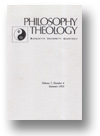|
articles |
|
1.
|
Philosophy and Theology:
Volume >
7 >
Issue: 4
Peter H. Van Ness
Conversion and Christian Pluralism
abstract |
view |
rights & permissions
| cited by
Some philosophers argue that a commitment to religious pluralism precludes the affirmation and encouragement of religious conversions on the grounds that decisions to convert are rationally unwarranted and, thus, their encouragement is ethically suspect. I challenge this view; furthermore, I contend that a proper understanding of religious conversion from a Christian and pluralistic point of view requires instead the identification of pluralism’s multiple meanings, i.e., as a descriptive category, a philosophical position, and an ideological construct.
|
|
|
|
|
2.
|
Philosophy and Theology:
Volume >
7 >
Issue: 4
Judson B. Trapnell
Bede Griffiths, Mystical Knowing, and the Unity of Religions
abstract |
view |
rights & permissions
| cited by
Strict constructivist philosophers conclude that no truth claims can be verified on the basis of mystical exploration due to the thoroughly conditioned character of such experiences. In response, Bede Griffiths’s life of dialogue between Christianity and Hinduism suggests that mystical knowing incorporates both conditioned and unconditioned elements. In the cross-culturally identifiable experience of self-transcendence in meditation, the relationship between the conditioned subject and the unconditioned sacred “object” is transformed, resulting in an intuitive knowledge for which different criteria of verifiability are both needed and available. Griffiths’s multireligious experience thus supports the identification of common ground for various religions in mystical knowing.
|
|
|
|
|
3.
|
Philosophy and Theology:
Volume >
7 >
Issue: 4
Norman Lillegard
Philosophers, Theologians, and the Pluralism Problem
abstract |
view |
rights & permissions
| cited by
Recently some theologians have argued that philosophical debates about the rationality of religious belief, such as the current evidentialism debate, are theologically irrelevant. For those debates assume the integrity of a particular religious tradition and neither provide a way of choosing between conflicting religions nor any way of sorting through conflicts which are internal to the particular religions (that is, they provide no solutions to “the pluralism problem”). In opposition to these claims I argue that the current evidentialism debate can provide resources which, taken together with Kierkegaard’s stress on subjectivity, enable fruitful discussion of the pluralism problem. I focus on the problem of diversity within a religion, but suggest applications to the problem of many religions.
|
|
|
|
|
4.
|
Philosophy and Theology:
Volume >
7 >
Issue: 4
William O’Neill
The Distinctiveness of Christian Morality:
A Dispute Revisited
abstract |
view |
rights & permissions
| cited by
Theologians differ not merely as to whether, but as to how Christian morality might be distinctive. In this essay, I consider the differing senses of distinctiveness in Christian ethics, i.e., how the predicate “Christian” qualifies the justification of moral judgment; the form, extension, and modal force of moral rules; and the morally relevant description of action in the theological ethics of Karl Barth and Hans Urs von Balthasar, and the “autonomy school” of Josef Fuchs and Bruno Schüller. The essay concludes with an assessment of the distinctiveness of Christian ethics in Iight of the foregoing criticism.
|
|
|
|
|
5.
|
Philosophy and Theology:
Volume >
7 >
Issue: 4
Philip J. Rossi
Editor’s Page
view |
rights & permissions
| cited by
|
|
|
|
